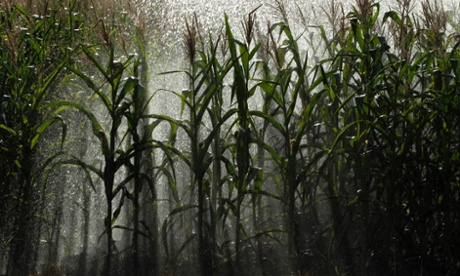Australian Academy of Science brings experts together to map out effects global warming on extreme weather events, infectious disease and food security

Climate change may threaten Australians’ livelihoods, affect the viability of communities and put pressure on social stability, the co-chairman of a thinktank hoping to influence public health responses has warned.
Emeritus professor Bruce Armstrong, of the University of Sydney’s school of public health, told Guardian Australia the issue was both publicly and scientifically important.
“Whatever some people might think, global warming is occurring and the climate is changing and it is easy to see how health can be impacted, but until now there has been a relatively small scientific contribution into these health impacts.
“People tend to look at climate change as just temperatures getting a little hotter and that being something they can manage. They don’t seriously see the impacts that will flow from a small increase in the average temperature where the net effect will be enormous.”
The Australian Academy of Science brought together 60 “early- and mid-career” scientists and researchers in Brisbane, hoping to influence how policymakers and governments respond to the impacts of climate change on public health.
It asked them to tackle the complex interactions between increasing weather extremes and the impacts on health.
The think-tank was organised into groups examining five key areas: temperature and extreme weather events, infectious disease, food and water supplies, livelihood and disadvantage, and security, social instability and conflict.
Each group spent two days analysing the key challenges in each area before making early recommendations to be translated into a report later in the year.
Armstrong said climate change had the potential to affect health directly through heatwaves and extreme weather, and indirectly through increases in the prevalence of certain diseases if, for example, public sanitation was compromised due to floods.
In an introduction, the president of the academy, Professor Andrew Holmes, wrote that the “impact of climate change on health and wellbeing is likely to be profound”.
“It’s been challenging,” said Monash University climate scientist Dr Ailie Gallant, one of the researchers asked to look at the impacts of climate change on future food and water supplies.
“We looked at everything from physical science issues such as the transport of pathogens in water supplies to future conflict issues.”
Earlier this year World Bank President Jim Yong Kim warned: “Fights over water and food are going to be the most significant direct impacts of climate change in the next five to 10 years.”
A feature of the think tank, said Professor Sharon Friel, of the College of Medicine, Biology and Environment at the Australian National University, was how multiple disciplines had been brought together to try to solve complex problems.
“We’ve had engineers, anthropologists, human geographers and public health researchers, for example, coming together to allow us to think about these climate change social inequalities and human health challenges in a way you just would not normally be able to do.”
Recommendations included improving early warning systems, better engaging disadvantaged communities, developing frameworks to link research, reducing food waste and more research into the links between conflict, instability and climate change.
Professor Neville Nicholls, of Monash University’s school of geography and environmental science, said: “Our recommendations are designed to save lives and improve livelihoods now and in the future.
“If we can do better at adapting to these events now and avoiding the health consequences of these extreme events then it is one of the best ways to adapt to the climate change that we can no longer avoid. This becomes more critical as governments are slow to mitigate.
“This is an attempt to influence the way research is organised in Australia. The recommendations are read by government ministers and senior bureaucrats and it’s a chance to point out what is not being done in the research field.”
Thirteen previous think-tanks have tackled issues including agricultural productivity, recovery of natural resources, water management and population increase.
The academy aims to have a complete report with recommendations to present to policymakers, politicians and the public by December.
